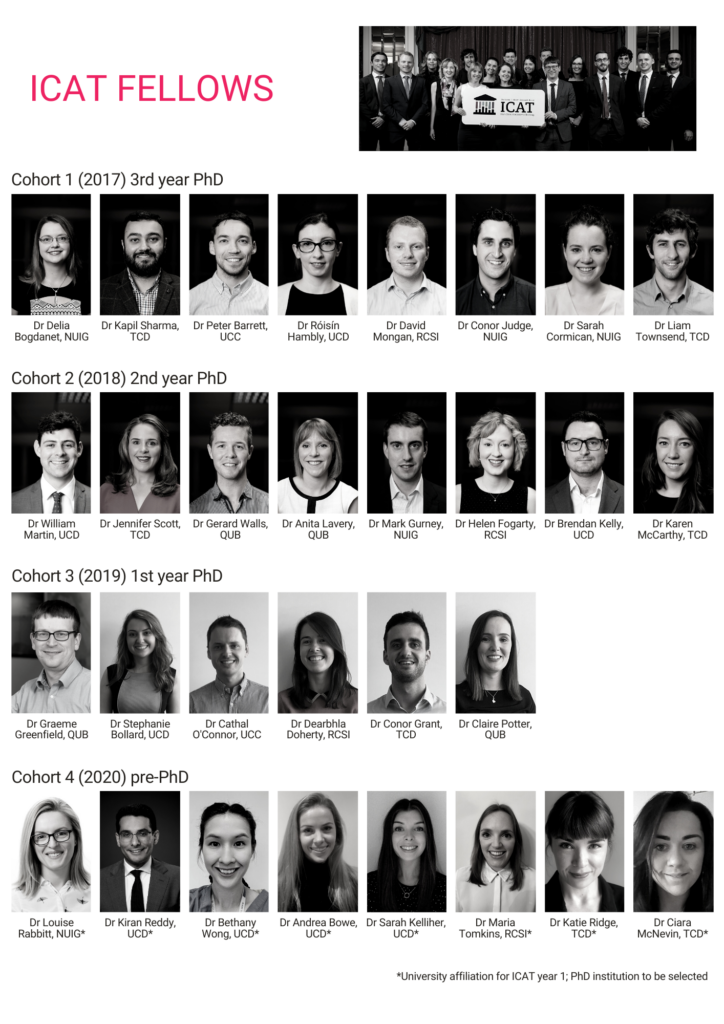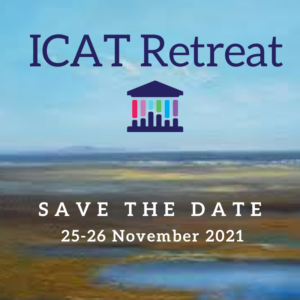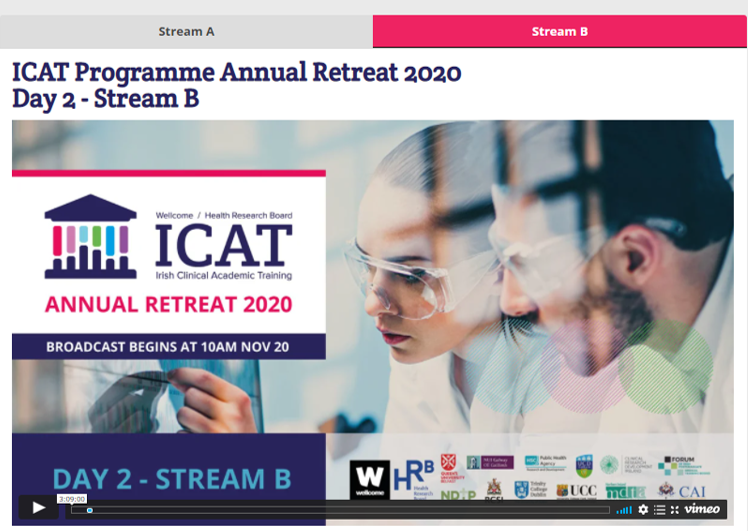The 4th annual ICAT Retreat took place on the 19th and 20th November 2020. Sadly, due to the COVID-19 pandemic and associated public health restrictions, we were not able to meet in person and we reconfigured our event to hold it virtually. However, there was a silver lining to this format, with easier access for our international friends. Thank-you to everyone who signed up for the event and watched the live stream. You can download the schedule here.
Our four cohorts of ICAT Fellows presented their research over the two day event, benefitting from a lively online Q&A!
In addition to our Fellows, we were delighted to host four speakers.
Speaker profiles:
 Dr Bernadette McGuinness, Consultant Geriatrician at the Belfast Trust and Senior Lecturer in the School of Medicine from Queen’s University Belfast, specialises in memory disorders including mild cognitive impairment and dementia. Dr McGuinness is currently leading grants funded by the Alzheimer’s Society, The Dunhill Medical Trust, HSC R&D, Atlantic Philanthropies, The Executive Office and the National Institute of Aging USA, and is Clinical Lead of the Northern Ireland Cohort of Longitudinal Ageing (NICOLA) Study. Dr McGuinness spoke about her research into mild cognitive impairment, progression to dementia and the impact of systemic infection, focusing on her research into the impact of periodontitis (severe gum infection).
Dr Bernadette McGuinness, Consultant Geriatrician at the Belfast Trust and Senior Lecturer in the School of Medicine from Queen’s University Belfast, specialises in memory disorders including mild cognitive impairment and dementia. Dr McGuinness is currently leading grants funded by the Alzheimer’s Society, The Dunhill Medical Trust, HSC R&D, Atlantic Philanthropies, The Executive Office and the National Institute of Aging USA, and is Clinical Lead of the Northern Ireland Cohort of Longitudinal Ageing (NICOLA) Study. Dr McGuinness spoke about her research into mild cognitive impairment, progression to dementia and the impact of systemic infection, focusing on her research into the impact of periodontitis (severe gum infection).
 Professor Gerard Curley is Professor of Anaesthesia and Critical Care at the Royal College of Surgeons in Ireland, Consultant in Anaesthesia and Intensive Care in Beaumont Hospital, Associate Scientist at the Keenan Research Centre for Biomedical Science at St Michael’s hospital, Toronto and Honorary Senior Lecturer at Queens University Belfast. Professor Curley’s research interests include the use of cell therapy for Acute Respiratory Distress Syndrome and sepsis, the mechanism of action of MSCs during inflammation and repair, including the interaction of MSCs with monocytes and macrophages, and in particular on macrophage phenotype, phagocytosis and bacterial killing during sepsis.
Professor Gerard Curley is Professor of Anaesthesia and Critical Care at the Royal College of Surgeons in Ireland, Consultant in Anaesthesia and Intensive Care in Beaumont Hospital, Associate Scientist at the Keenan Research Centre for Biomedical Science at St Michael’s hospital, Toronto and Honorary Senior Lecturer at Queens University Belfast. Professor Curley’s research interests include the use of cell therapy for Acute Respiratory Distress Syndrome and sepsis, the mechanism of action of MSCs during inflammation and repair, including the interaction of MSCs with monocytes and macrophages, and in particular on macrophage phenotype, phagocytosis and bacterial killing during sepsis.
 Professor Caroline Sabin, Professor of Medical Statistics and Epidemiology and Director of the National Institute for Health Research (NIHR) Health Protection Research Unit in Blood-Borne and Sexually Transmitted Infections at University College London. Professor Sabin’s interests are in describing the natural history of HIV infection, identifying prognostic markers and describing responses and adverse events to combination antiretroviral therapy. She established the UK Collaborative HIV Cohort (UK CHIC) Study, was the principal statistician for the D:A:D Study and is the co-PI for the Pharmacokinetic and clinical Observations in PeoPle over fiftY (POPPY) study, the first large-scale study in England and Ireland to assess the clinical outcomes of people living with HIV over the age of 50. Professor Sabin presented her research on multi-morbidity (two or more chronic conditions) in individuals with HIV, using data-driven approaches to identify clusters of disease. Prof. Sabin discussed the importance of appropriate and inclusive investigations, not limited to biomedical events that are easier to define than ‘softer’ events such as mental health, sleep problems and chronic pain.
Professor Caroline Sabin, Professor of Medical Statistics and Epidemiology and Director of the National Institute for Health Research (NIHR) Health Protection Research Unit in Blood-Borne and Sexually Transmitted Infections at University College London. Professor Sabin’s interests are in describing the natural history of HIV infection, identifying prognostic markers and describing responses and adverse events to combination antiretroviral therapy. She established the UK Collaborative HIV Cohort (UK CHIC) Study, was the principal statistician for the D:A:D Study and is the co-PI for the Pharmacokinetic and clinical Observations in PeoPle over fiftY (POPPY) study, the first large-scale study in England and Ireland to assess the clinical outcomes of people living with HIV over the age of 50. Professor Sabin presented her research on multi-morbidity (two or more chronic conditions) in individuals with HIV, using data-driven approaches to identify clusters of disease. Prof. Sabin discussed the importance of appropriate and inclusive investigations, not limited to biomedical events that are easier to define than ‘softer’ events such as mental health, sleep problems and chronic pain.
 Professor Paul Stewart is the Executive Dean of the Faculty of Medicine & Health at the University of Leeds and Honorary Consultant Endocrinologist at the Leeds Teaching Hospitals NHS Trust. Professor Stewart is a primary investigator within the National Institute for Health Research (NIHR) Musculoskeletal Biomedical Research Centre in Leeds and an Emeritus NIHR Senior Clinical Investigator. He is Vice President (Clinical) and member of Council of the Academy of Medical Sciences, executive member of the Medical Schools Council (MSC) and Editor-in-Chief of the Journal of Clinical Endocrinology and Metabolism (JCEM). Professor Stewart is also the Chief Scientific Advisor for the Scar Free Foundation, board member of the Dementias Platform UK (DPUK), steering committee member of the Association of Academic Health Centers International (AAHCI) and strategic advisory board member of the Yorkshire & Humber AHSN (Academic Health Science Network). He is a steering group member for both the Cancer Research UK (CRUK) and the DATA-CAN (UCLPartners) and is actively involved in nurturing and supporting early research careers most recently through his role on the UK Clinical Academic Training Forum. Professor Stewart’s clinical expertise includes the management of pituitary and adrenal disorders, endocrine hypertension and reproductive medicine. Professor Stewart supervises an active endocrinology research group which focuses on corticosteroids, specifically cortisol metabolism via 11 β -hydroxysteroid dehydrogenases, and his work has led to new discoveries in hypertension, obesity, ageing and polycystic ovary syndrome. Professor Stewart spoke passionately about his career highs and lows and gave some valuable advice to our Fellows who are embarking on their careers in clinical academia.
Professor Paul Stewart is the Executive Dean of the Faculty of Medicine & Health at the University of Leeds and Honorary Consultant Endocrinologist at the Leeds Teaching Hospitals NHS Trust. Professor Stewart is a primary investigator within the National Institute for Health Research (NIHR) Musculoskeletal Biomedical Research Centre in Leeds and an Emeritus NIHR Senior Clinical Investigator. He is Vice President (Clinical) and member of Council of the Academy of Medical Sciences, executive member of the Medical Schools Council (MSC) and Editor-in-Chief of the Journal of Clinical Endocrinology and Metabolism (JCEM). Professor Stewart is also the Chief Scientific Advisor for the Scar Free Foundation, board member of the Dementias Platform UK (DPUK), steering committee member of the Association of Academic Health Centers International (AAHCI) and strategic advisory board member of the Yorkshire & Humber AHSN (Academic Health Science Network). He is a steering group member for both the Cancer Research UK (CRUK) and the DATA-CAN (UCLPartners) and is actively involved in nurturing and supporting early research careers most recently through his role on the UK Clinical Academic Training Forum. Professor Stewart’s clinical expertise includes the management of pituitary and adrenal disorders, endocrine hypertension and reproductive medicine. Professor Stewart supervises an active endocrinology research group which focuses on corticosteroids, specifically cortisol metabolism via 11 β -hydroxysteroid dehydrogenases, and his work has led to new discoveries in hypertension, obesity, ageing and polycystic ovary syndrome. Professor Stewart spoke passionately about his career highs and lows and gave some valuable advice to our Fellows who are embarking on their careers in clinical academia.
For anyone who would like to view a recording of the Retreat, please contact us.
Thank-you
The ICAT Retreat is an important milestone in the academic calendar and feedback provided to Fellows is used to further develop their projects and to develop collaborations. We are indebted to the members of our extensive network who supported this meeting, attending the talks, chairing sessions and contributing to the discussion of our ICAT Fellow research projects – thank-you again to all of our participants.
We are hopeful that we will be able to hold the next ICAT Retreat in person. Peer-to-peer support, building relationships within and between cohorts, and informal mentorship between the Fellows and the Executive Team are important experiences within ICAT and we look forward to meeting again.
Save the date
The next ICAT Retreat is scheduled to take place on 25th and 26th November 2021.

